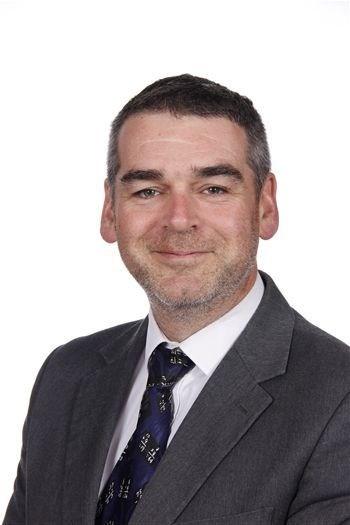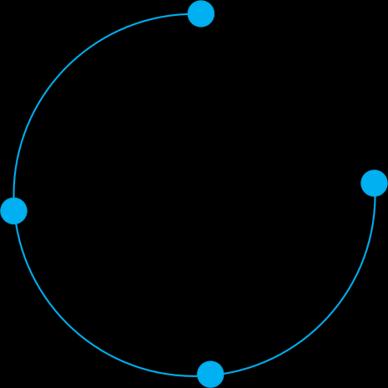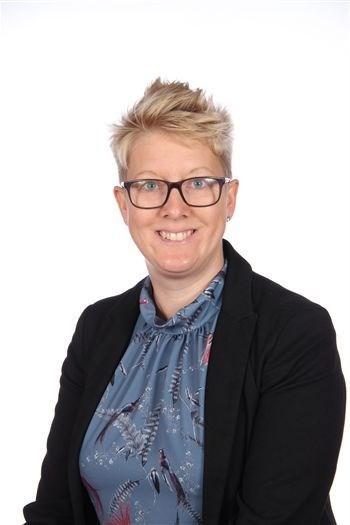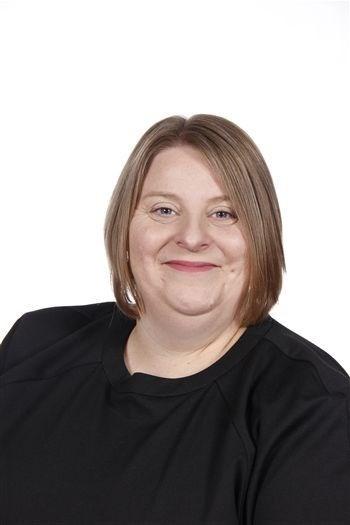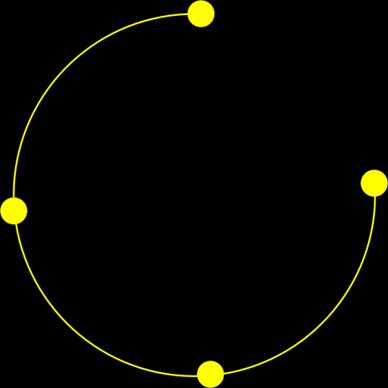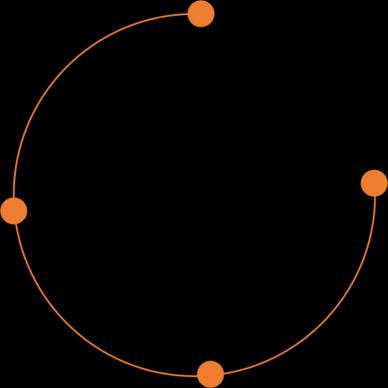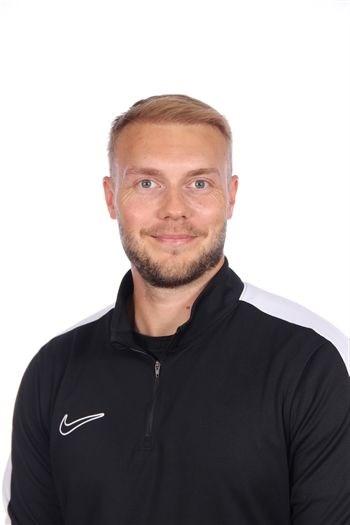









Your child is reaching an important stage, where in Year 10, they will begin Key Stage 4 and start their GCSE and/or BTEC/ vocational qualifications and within that they have some element of choice.
At Sirius North, we aim to ensure that all our students achieve the best that they possibly can. With this in mind, the curriculum that we offer is designed to meet the needs of students and to allow for the best possible opportunities in the future.
The curriculum in Key Stage 4 is made up of compulsory and optional elements. The compulsory elements are known as the core subjects and comprise of:
• Mathematics
• English Language and Literature
• Science
• Life
• Physical Education
The optional element includes a broad range of subjects as we commit to broadening horizons for your child and open up opportunities for post 16 education. Details of these subjects and their courses can be found in this booklet. It is important that students keep their options for the future as open as possible and we therefore strongly advise that the subjects selected ensure that a balanced curriculum is followed.
The options process is complex and the school is committed to guiding students towards suitable choices. However, limitations on class size and available resources can inhibit complete freedom of choice.
Final decisions about subject availability in relation to student choice will rest with the academy.

Step 1
Options Booklet | Sirius Academy North
All students will need to access the options booklet online. The booklet will provide students with an understanding of all the courses available to them. This includes: content of each course, specific assessment methods within the subject and potential career routes.

Step 2
Attend the parents evening to receive extra information and to hold discussions with staff.
Students will be informed about course content and should be discussing all the options available.
Any concerns can be brought to Mr Williamson.

Step 3
Option Forms | Deadline: Thursday 30th January 2025
All students will be expected to select a number of preferences based on their knowledge of the course available. The forms must be returned online by the deadline.


All students will follow the Core Curriculum
CORE CURRICULUM
Course
GCSE English Language
GCSE English Literature
GCSE Mathematics
GCSE Combined or Triple Science
Life

Subject
English
English
Physical Education* PE &
HUMANITIES AND LANGUAGES
Course
GCSE History
GCSE Geography
Subject
Humanities
Humanities
GCSE French MFL
Course
GCSE Art & Design
Child Development
GCSE Computer Science
Dance
Drama
Engineering
GCSE Business
Hospitality & Catering
Information Technology
Music
GCSE Photography
GCSE Religious Studies
Sport Science
GCSE Textiles
Travel & Tourism
Health & Social Care
Subject
Art & Design
Child Development
Computer Science
Dance
Drama
Engineering
Business
Hospitality & Catering
ICT
Music
Photography
RE
Sport
Textiles
Travel & Tourism
Health and Social
Core Curriculum:
All students will follow these courses in Year 10 and these are non-negotiable.
*All students will be required to participate in a PE & Life lesson each week. Students will not be formally assessed within these lessons and will not receive a grade at the end of Year 11.
Humanities and Languages Curriculum:
Students in all pathways will choose to study either GCSE Geography or GCSE History.
The academic pathway students will all study French and have the opportunity to study Geography or History.
The students in the academic pathway will have one option and the core curriculum pathway with have two options..
Final decisions about subject availability in relation to student choice will rest with the academy.
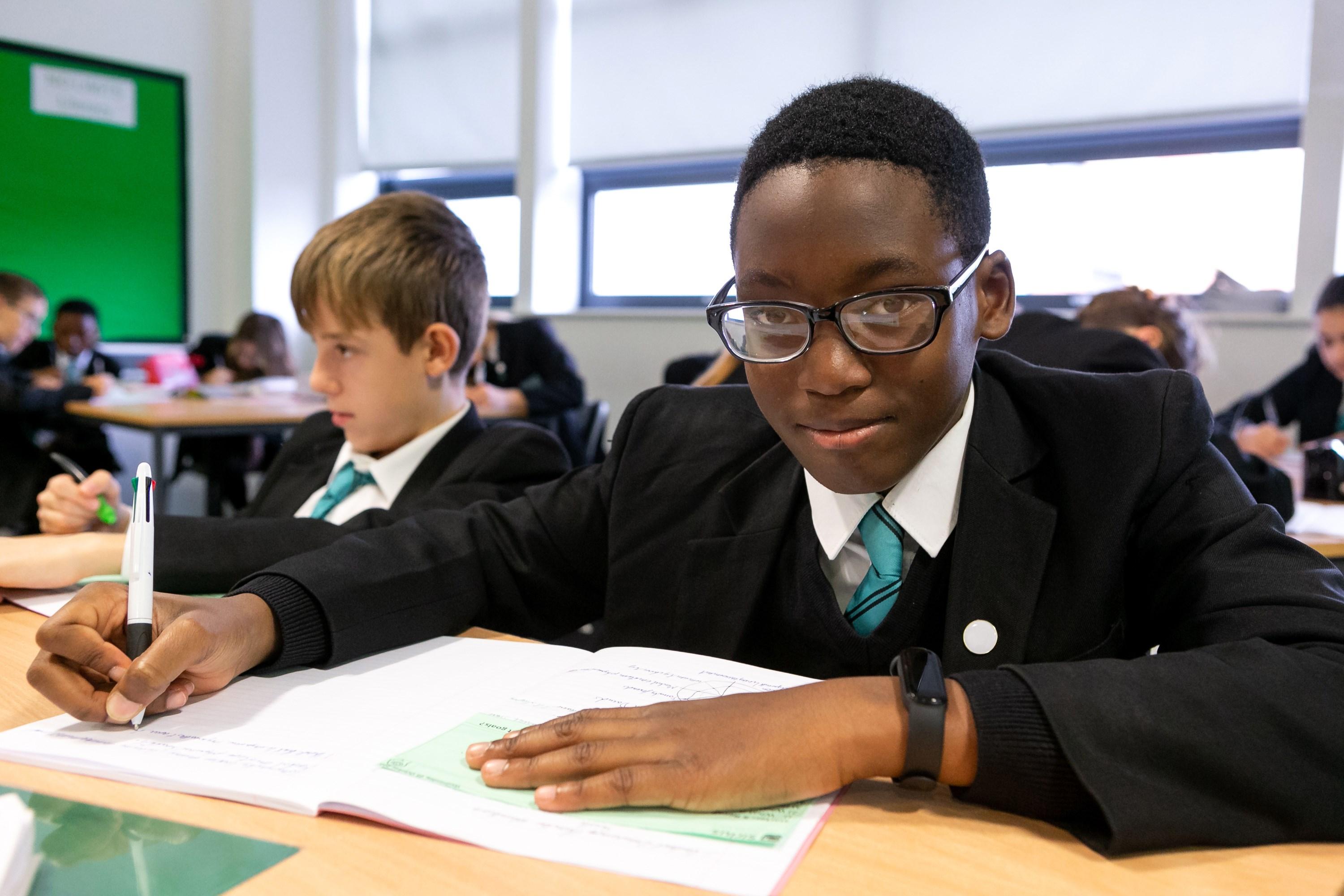
You will complete two exams (Grade 1-9):
Paper 1 Non-Fiction Texts
Students will study a range of functional 19th century non-fiction texts. Develop skills to analyse and evaluate non-fiction extracts. Develop transactional writing skills for a variety of forms, purposes and audiences.
Paper 2: Contemporary Texts:
Students will study a range of 20th and 21st century prose fiction and literacy non-fiction. Develop skills to analyse and compare 20th and 21st century fiction and literary non-fiction extracts. Develop imaginative writing skills to engage the reader
English plays a vital role in preparing students for further study and their future careers. Every job requires employees to have strong literacy skills in order to be able to communicate effectively. There are many careers in where English skills provide a vital stepping-stone to success. These include: Media and Journalism, Teaching and Academia, Advertising, Marketing and Public Relations, Law
If you require and further information, please contact Mrs Bond (Director of English), or Miss Stirling (Assistant Director of English).
“It is not enough to simply teach children to read; we have to give them something worth reading. Something that will stretch their imaginations - something that will help them make sense of their own lives and encourage them to reach out toward people whose lives are quite different from their own.”
Katherine Paterson


Over the course of Year 10 and Year 11, students will gain two GCSE qualifications in English: English Language and English Literature.
English Literature – Students will complete two exams (Grade 1-9)
Paper 1 (50%): Shakespeare and the 19th Century Novel: Students will study Macbeth by William Shakespeare and A Christmas Carol by Charles Dickens.
Paper 2 (50%): Modern Texts and Poetry: Students will study An Inspector Calls and a range of poetry from the Conflict cluster. You will also study and compare unseen poetry.
English plays a vital role in preparing students for further study and their future careers. Every job requires employees to have strong literacy skills in order to be able to communicate effectively. There are many careers in where English skills provide a vital stepping-stone to success. These include: Media and Journalism, Teaching and Academia, Advertising, Marketing and Public Relations, Law
If you require and further information, please contact Mrs Bond (Director of English), or Miss Stirling (Assistant Director of English).
“The best word shakers were the ones who understood the power of words. They were the ones who could climb the highest.” Marcus Zusak

Students will follow the OCR GCSE (9-1) course at Foundation tier (Grades 1 – 5) or Higher tier (Grades 4 – 9). There are 3 x 1 hour 30 minute written exams, two of which allow you to use a calculator. The scores are added together and grade boundaries are determined by the exam board.
Students are grouped into sets according to their ability, knowledge and learning needs. This provides students with the opportunity to work at an appropriate pace and depth of understanding. We aim to give each student confidence, satisfaction and a sense of achievement as they progress through the course. Students are encouraged to develop their skills to use mathematics to solve problems and seek out solutions.
The course is delivered by an experienced team of specialist mathematics teachers, and covers a wide range of topics including Number, Algebra, Ratio & Proportion, Geometry & Measures, Probability and Statistics.
You can find further details about the topics covered at the link below: https://www.ocr.org.uk/Images/168982-specification-gcse-mathematics-j560.pdf
A good qualification in Mathematics provides a strong foundation for further academic and vocational study and for future employment. It is a well-known fact that the vast majority of the best paid jobs are done by people with a high level of mathematical ability
Possible careers include: Accountancy, Business, Computer Science, Construction, Energy, Education, Engineering, Environment, Financial Services, Food and Drink, Healthcare, Manufacturing, Science, Telecommunication and many more exciting careers.
If you require further information, please speak to Mr. Ritchie (Director for Maths), Miss Carter (KS 3 co-ordinator for Maths) or Mr Oades (KS4 co-ordinator for Maths).
“Maths is the language in which the universe is written. It’s innate to the human brain and is a spectacular thing that we’ve discovered/invented” Dara O Briain – Comedian and Television Presenter
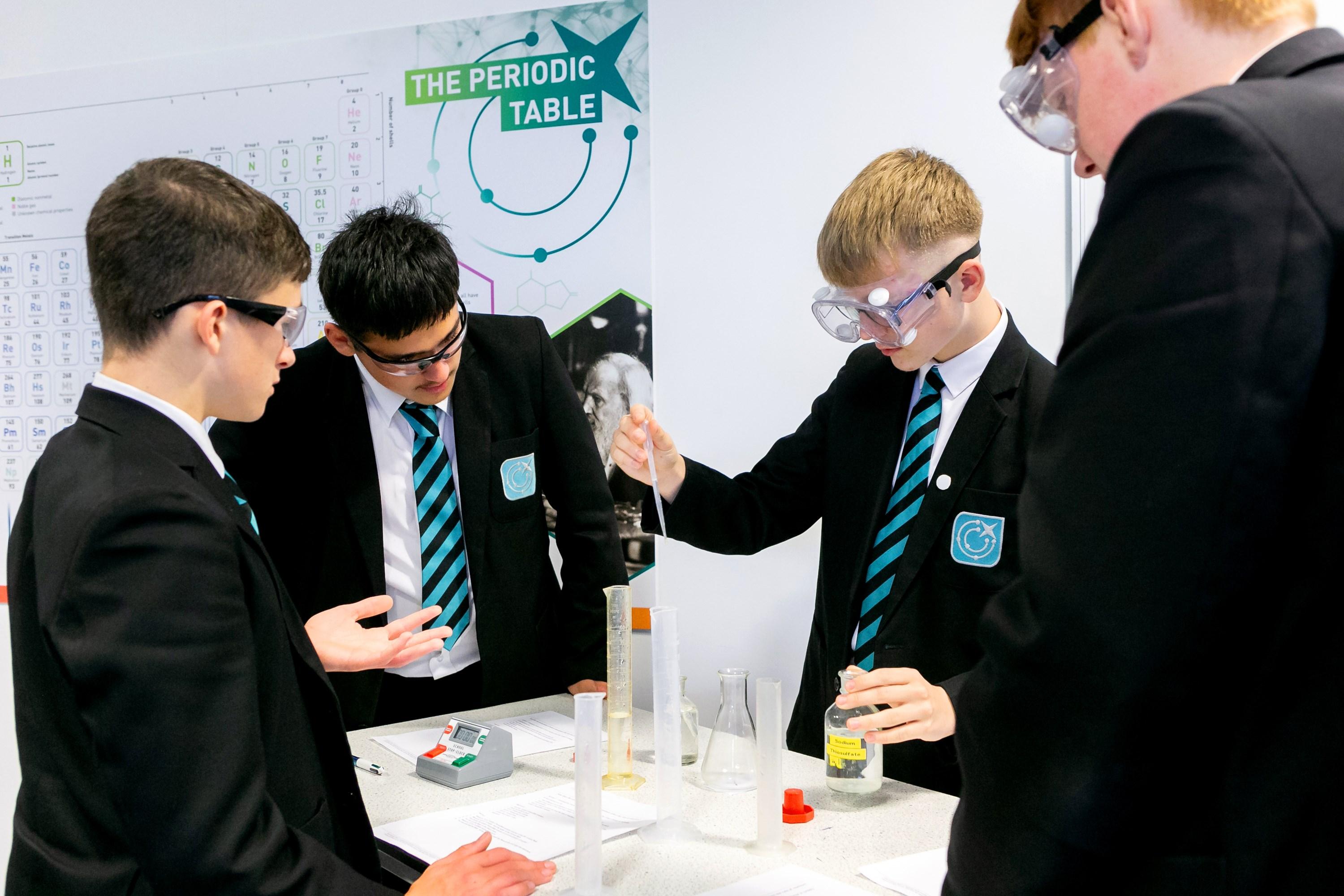

Students will follow the AQA Trilogy Science scheme of learning. This scheme is a double award scheme meaning students will leave us with 2 GCSE grades in science. As part of this you will sit either the Higher (4,4-9,9) or Foundation (1,1-5,5) with the exams split into six 1 hour 15 minute papers with 2 papers for Chemistry, Physics & Biology.
Students are set based around ability, prior understanding and additional needs so that all students are given the best opportunity to succeed. Each paper covers a distinct part of the curriculum with working scientifically skills, math skills and application of knowledge spread between all units.
Biology: Paper 1 – Cell biology, Organisation, Infection & Response, Bioenergetics.
Biology: Paper 2 – Homeostasis, Inheritance, Variation & Evolution, Ecology. Chemistry: Paper 1Atomic Structure, Bonding & Properties of matter, Quantitative Chemistry, Chemical Changes & Energy Changes.
Chemistry: Paper 2- Rate of Reaction, Organic Chemistry, Chemical Analysis, Atmosphere, Using Resources.
Physics: Paper 1 – Energy, Electricity, Particle Model of Matter, Atomic Structure. Physics: Paper 2 –Forces, Wave, Magnetism & Electromagnetism
Are you interested in understanding the world around you and being involved in making discoveries that shape the future? A science GCSE can open up many doors into either further study or exciting careers.
Possible career paths that you can use a science GCSE for are: Medical Sciences, Nursing, Midwifery, Physiotherapy, Sports Rehabilitation, Forensic Sciences, Health & Safety, Architecture & Design, Hairdressing, Environmental Sciences, Engineering, Science Teacher, Lab Technician, Marine Biology, Nuclear Physics, Medical Physics, Radiographer, Scientific research.
If you require any more information speak to Mr Townsend and ask the science team about our degree areas!
“Nothing in life is to be feared, it is only to be understood. Now is the time to understand more, so that we may fear less.” Marie Curie (Nobel Prize Winner in Physics)

The GCSE in Religious Studies provides the opportunity for all students to learn about the beliefs, teachings and practices of two of the world’s major religions. Also, students study different religious, philosophical and ethical themes, which allows them to consider and express their own viewpoints on a range of issues regarding life and society.
In this course, there are three exams which will equate to a full GCSE qualification graded 1-9. Religious, Philosophical and Ethical Studies in the Modern World (2 hours, worth 50%)
You will study;
Issues of Relationships
Issues of Life and Death
Issues of Good and Evil
Issues of Human Rights
Study of Christianity (1 hour, worth 25%)
You will study: Beliefs, Teachings and Practices of Christianity.
Study of a World Faith (1 hour, worth 25%)
You will study: Beliefs, Teachings and Practices of Islam.
RE links to hundreds of different careers from Priesthood to journalism. You do not have to be religious to study religious studies; it provides key skills for many careers. You may go on to AS and A2 level Religious Studies. Also useful for AS/A2 courses in Philosophy, Critical Studies and Anthropology.
Studying RE would benefit you in a career in social work and a career in the police, as it allows you to understand diversity and equality in society and develop empathy for others.
For any further information or details contact Mrs Bateson and Miss Platts. “If we cannot now end our differences, at least we can help make the world safe for diversity.” John F. Kennedy.

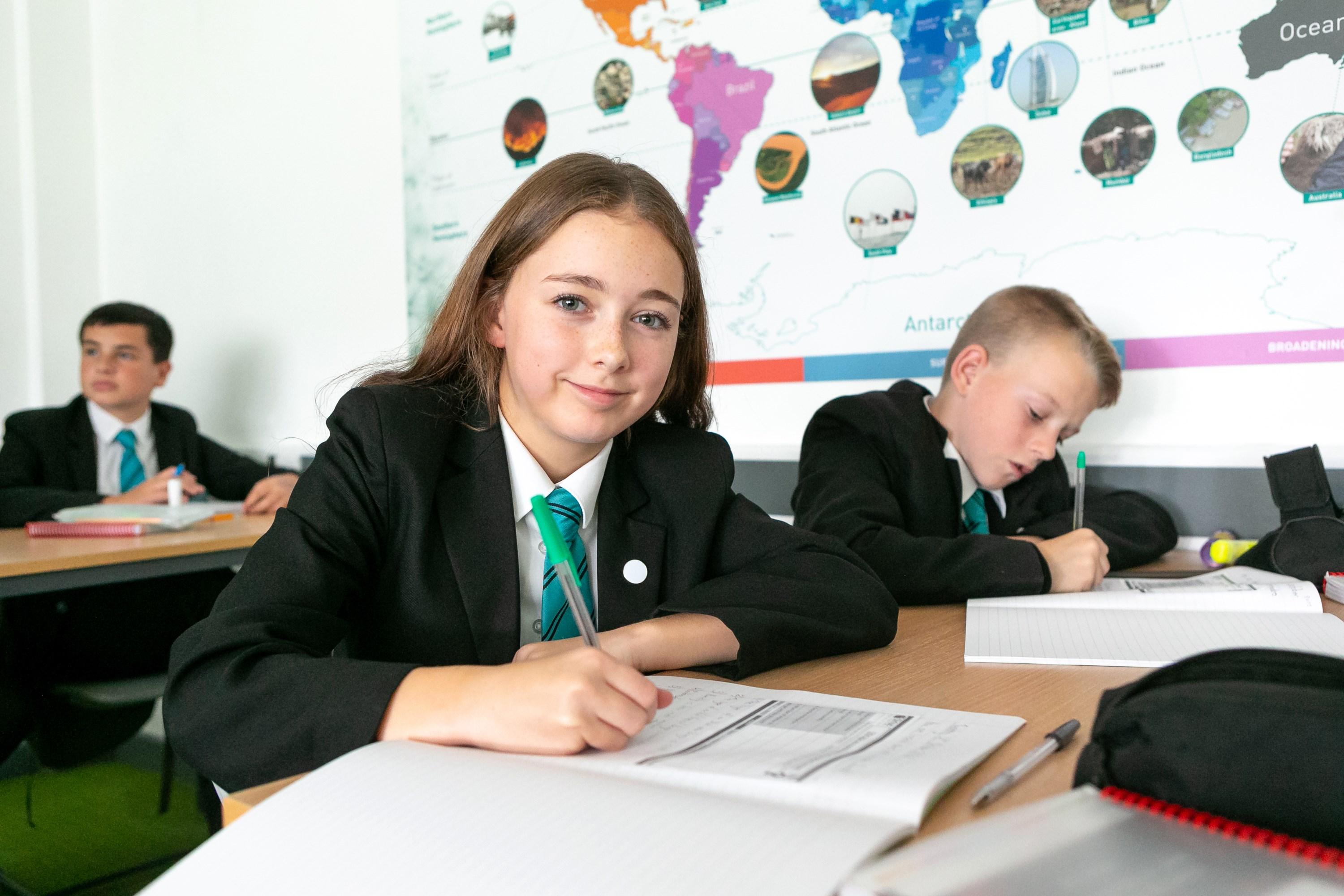
Here at Sirius Academy North we follow the Edexcel A GCSE Geography course. It is split into three components:
Unit 1: The Physical Environment (1 hour 30 minute exam) 37.5% (Weather hazards and Climate Change, UK Landscapes, River Landscapes, Coastal Landscapes and Ecosystems and Management)
Unit 2: The Human Environment (1 hour 30 minute exam) 37.5% (Changing Cities, Global Development and Energy Resource Management)
Unit 3: Geographical Investigations: Fieldwork (visiting a rural and a coastal environment) and UK Challenges (1 hour 30 minute exam) 25% (Two fieldwork investigations and UK Challenges) Over the course of the GCSE students will build and develop enquiry skills, place knowledge, perception of patterns and processes, language and literacy and numeracy skills.
GCSE Geography can open doors to a range of jobs and further areas of academic study. Geography is about the future and its study encourages flexible thinking and decision making, both crucial attributes in today’s ever-changing job market. Jobs directly related to geography: Journalism, Weather forecaster, Environmental consultant officer GIS: Geographical information systems officer, Planning and development surveyor, Town planner, Travel Agent, Transport/ logistics planner, Cartographer, Photographer, Accountancy/banking/finance
If you need further information, please speak to Ms. Blanchard (Director of Geography) or Mr. Pilkington (Coordinator of Geography).
"It's surely our responsibility to do everything within our power to create a planet that provides a home not just for us, but for all life on Earth."
David Attenborough

In History, students can achieve one GCSE at grade 9 - 1.
Paper 1 - Medicine Through Time – 30%
Students will start with Medicine through time. They will trace this thread over the next 1000 years to see how it has changed and stayed the same. Finishing by looking at Battlefield Medicine in WW1
Paper 2 - Early Elizabethan England - 20%
Students explore a pivotal moment in English history as the country transformed under its most famous queen. The unit begins with the religious, political and gender turmoil of the Tudors. It considers how England achieved a fragile stability and dramatically defeated a global superpower.
Paper 2 - The Cold War and International Relations – 20%
This unit looks at how the two ‘superpowers’ of the USA and USSR dominated the globe in the ‘Cold War’ for five decades. They will also see how this dangerous conflict dramatically ended with demonstrations of people power in 1989.
Paper 3 - Weimar and Nazi Germany – 30%
Students will examine how Germany struggled through the 1920s before the election of Adolf Hitler and the descent into the nightmare of the Nazi dictatorship in the 1930s.
History is a lifelong curiosity, so we aspire for our students to develop a deep understanding of the events of the past. To enable them to be aware and learn from the past to promote tolerance, respect and liberty.
The analytical skills acquired are valued in a wide range of careers. The skills acquired: questioning, arguing a case and using inference are inter-changeable for many future jobs. Possible careers where an History GCSE is valued include: Solicitor, Lawyer, Barrister, Researcher, Journalism and Broadcast Media, Media Executive, Marketing Executive, Teaching and Lecturing.
If you need further information, please speak to Mrs. Bateson (Director of History and R.E and PSHE).

'Those who don't know history are doomed to repeat it. ' Edmund Burke


Students will complete a Listening, Reading, Speaking and Writing exam at either Foundation (Grades 1-5) or Higher (Grades 5-9). Each exam is worth 25% of your marks and you have to complete all the exams to get a grade overall.
Students will study 3 themes:
Theme 1 – Identity and Culture where you will learn to talk about yourself, your relationships with your family and friends as well as modern technology and customs and festivals in the UK and in France and French speaking countries.
Theme 2 – Local, national, international and global areas of interest where you will learn how to talk about where you live, issues threatening the world and how to describe past and future holidays.
Theme 3 – Current and future study and employment where you will learn how to talk about your school and your plans for the future in terms of studying and getting a job. You will practise all the skills you need for the exams in each lesson and you will learn how to translate out of and in to French.
A qualification in a language can lead you into lots of jobs. You could become an interpreter (where you use mainly spoken language) or a translator (where you are translating documents, books etc), you could become a languages teacher but there are also many jobs which having a degree in languages would be useful for. Here are just some examples: Broadcast Journalist, Travel Blogger, Detective, Diplomatic Service Officer, English as a foreign language Teacher, International Aid/Development worker, Marketing Executive, or Sales Executive.
If you need further information, please speak to Mrs Cox (Director of MFL).
"One language sets you in a corridor for life. Two languages open every door along the way."
Frank Smith


Computer Science is an exceptional field, as whatever the era – computing jobs are here to stay. Computer Scientists are majorly sought after. Computing enables you to make a positive difference in the world – you could build systems for hospitals, program automated limbs, create new and innovative ways for children to learn using technology, create programs that can help people with their daily lives; it’s truly a versatile field and this course is a beginning to it. You will study two components:
Component 01: Computer systems – This component Introduces central processing unit (CPU), computer memory and storage, data representation, wired and wireless networks, network topologies, system security and system software. It also looks at ethical, legal, cultural and environmental concerns associated with computer science. This component heavily focuses on architecture and computing theory.
Component 02: Computational thinking, algorithms and programming – In this component, you will gain and apply knowledge and understanding gained in component 01. You will develop skills and understanding in computational thinking: algorithms, programming techniques, producing robust programs, computational logic and translators. This is where you will create, debug and execute your own programs and learn to test them.
A GCSE in Computer Science will provide you with exceptional problem-solving skills, regardless of what you choose to do later in life. This qualification will enable you to pursue many roles. It could lead to a position in: Cybersecurity , Games development, Artificial intelligence or robotics. The possibilities are endless!
If you require any more information regarding Computer Science, please speak to Miss Brown or Miss Peacock. If you have a spark for programming - don’t hesitate!
“Humans are allergic to change. They love to say, ‘We’ve always done it this way.’ I try to fight that. That’s why I have a clock on my wall that runs counter-clockwise.” Grace Hopper

Are you passionate about technology? Do you like solving problems? Are you curious about all things digital, and want to learn some fantastic new skills? If so, it’s time to uncover your potential. You will study two mandatory units, one is externally assessed with an online examination the second coursework based.
ICT usage is becoming increasingly widespread in day-to-day life, as people become progressively dependent on digital devices. Jobs in ICT exist in a variety of context, however, there are key areas of knowledge that all ICT specialists will be required to know. This course will enable you to prove that you have the key areas required for any job involving ICT.
Unit 1 – ICT in Society – This unit allows you to explore a wide range of uses of hardware, applications and specialist software used in society. You will investigate how information technology is used in a range of context, including business, education and at home.
Unit 2 – ICT in Context – This unit will introduce you to a broader knowledge of databases, spreadsheets, automated documents and images. It will enable you to apply your knowledge and understanding to solve problems.
A qualification in ICT will be beneficial for your future as this course provides a strong base for progression to further education. The work you will cover could lead to work in a vast majority of areas such as data analyst, network management or software development. Careers progression - Careers progression could be data analyst, digital content producer, systems engineer or web marketing manager.
If you require any more information regarding ICT, please speak to Miss Brown or Miss Peacock. You could also speak to a number of the year 10 and 11 students who are currently completing the course.
" Technology alone is not enough. It's technology married with the liberal arts, married with the humanities, that yields the results that makes our hearts sing” Steve Jobs

This GCSE is structured into two themes, taking students from how entrepreneurs start businesses (Theme 1) through to growing and global businesses (Theme 2). There are two equally weighted exam papers, focusing on each specification theme.
You will study two themes:
Theme 1: Investigating Small Business – Topic 1.1 Enterprise and entrepreneurship. Topic 1.2 Spotting a business opportunity. Topic 1.3 Putting a business idea into practice. Topic 1.4 Making the business effective. Topic 1.5 Understanding external influences on business.
Theme 2: Building a Business – Topic 2.1 Growing the business. Topic 2.2 Making marketing decisions. Topic 2.3 Making product decisions. Topic 2.4 Making financial decisions. Topic 2.5 Making human resource decisions.
A GCSE in Business will help you to develop as enterprising individuals with the ability to think commercially and creatively to demonstrate business acumen, and draw on evidence to make informed business decisions and solve business problems. Develop as effective and independent student, and as critical and reflective thinkers with an enquiring mind.
Formoreinformation
If you require any more information regarding GCSE business, please speak to Miss Brown or Miss Cuttell. This is a brand new course offered in the academy, so if you are the next Steven Bartlett this could be the course for you.
“The most successful people in the world are the ones who never stop learning.” Steven Bartlett - Dragons Den


OCR Cambridge National in Sports Science is an option for those students who love Physical Education, sport and physical activity. The course is a mix of theory and practical where you will be involved in learning about fitness, personal training, diet/ wellbeing and sports injuries.
The two mandatory units are:
R180: Reducing the risk of sports injuries and dealing with common medical conditions This is assessed by an exam. By completing this unit, students will prepare as a participant to take part in physical activity in a way which minimises the risk of injuries occurring.
R181: Applying the principles of training: fitness and how it affects skill performance This is assessed by a set assignment. By completing this unit, students will conduct a range of fitness tests, understand what they test and their advantages and disadvantages.
Optional unit:
R183: Nutrition and sports performance This is assessed by a set assignment. By completing this unit, you will gain understanding of healthy, balanced nutrition. Students will consider the necessity of certain nutrients and their role in enabling effective performance in different sporting activities.
A qualification in Sport can lead you into lots of jobs in the sports industry. Here are just some examples: PE teacher, sports coach, sports pundit, sports scientist, personal trainer, nutritionist, sports development officer, sports journalist, physiotherapist, sports analyst or an outdoor activity leader.
Please speak to Mr Dorsett (Director of PE) for more information or a member of the PE department.
Persistence can change failure into extraordinary achievement. Matt Biondi

Do you want to enter the health and social care sector? This course will give you clear knowledge, skills and behaviours to succeed in the future, you will learn about many rewarding jobs available across the sector, the care values that underpin professional practice and legislation in these professions.
The qualification comprises of 1 examination unit and 1 unit of controlled assessment. Each unit is worth 50% of the overall grade. You will study a number of different elements, covering:
• Health and social care provisions and services
• Jobs in health and social care
• Legislation, policies and procedures
• Human development and life span
• The care needs of individuals
• How health and social care services are accessed
• Partnership working in health and social care
• The care planning cycle
This course will provide you with opportunities to acquire a number of practical and technical skills.
A qualification in Health and Social Care will be beneficial for your future. You will be able to continue with level 3 qualifications, which can lead to university. Or you may wish to progress onto an apprentership in any number of specialisms in health and social care.
If you require any more information Health and social care, please speak to Miss Brown or Miss Willis. You could also speak to a number of the year 10 and 11 students who are currently completing the course.
“Unless someone like you cares a whole awful lot, nothing is going to get better. It’s not.” - The Lorax by Dr. Seuss



This course has been designed for students who are interested in the hospitality and catering industry. It is divided into two units:
Unit one: The Hospitality and Catering Industry - This is a written exam sat at the end of the course which is worth 40% of your grade. The unit consists of four learning outcomes:
• Understand the environment in which hospitality and catering providers operate.
• Understand how hospitality and catering provisions operate.
• Understand how H&C provision meets health and safety requirements.
• Know how food can cause ill health.
Unit two: Hospitality and Catering in Action - This is a piece of coursework that is internally assessed by your teacher and externally moderated. It is completed in 12 hours, including a 3hour practical exam and is worth 60% of your final grade. The applied purpose of the unit is for learners to safely plan, prepare, cook, present and evaluate nutritional dishes for a brief that is set in the September of your second year.
A qualification in Hospitality and Catering can lead you into many different of jobs and apprenticeships. Here are just some examples:
Chefs, waiters, restaurant managers, hotel managers, journalism, dietician, product development, sports science, marketing, environmental health, consumerism, nutritionists, event planning
If you need further information, please speak to Miss Branch-Evans (Director of Technology)
“Good chefs cook because they have to, great chefs cook because they want to”. anonymous

Students are required to successfully demonstrate the knowledge and skills to meet the requirements of all 9 content areas of this qualification:
• Engineering disciplines
• Applied science and mathematics in engineering
• Reading engineering drawings
• Properties, characteristics and selection of engineering materials
• Engineering tools, equipment and machines
• Hand-drawn engineering drawings
• Computer-aided deign (CAD) engineering drawings
• Production planning techniques
• Applied processing skills and techniques
Unit one - A written exam sat at the end of the course which is worth 40% of your final grade. Unit two - A piece of coursework that is internally assessed by your teacher and externally moderated. It is worth 60% of the final grade.
A qualification in engineering can lead you into lots of jobs. You could follow a career in the Hull based Siemens factory, become a software engineer, F1 mechanic or you could even become a design technology teacher. There is a huge list of jobs an engineering qualification would be useful for; here are just a few examples: Advanced Manufacturing, Aerospace and Space, Big Data, Oil and Gas industry, Low Carbon Economy, Life Science, Road and Rail transport.
If you need further information, please speak to Mr McNiff or Mr Smith (Teacher of Technology) or Miss Branch-Evans (Director of Technology).

“Others dream of things that were, and ask 'Why?' I dream of things that never were, and ask 'Why not?'" Cardinal Saint-Saens


Studying Photography will flourish your skillset in imagination and individual approaches to capturing forms of images. In this GCSE course, there are two components which are completed across the two year course.
Component one: Portfolio
A portfolio of photography work which evidences learner’s journey from initial engagement to the final outcome of a project. Through this portfolio learners will carry out artist research and experiments in their style. They will annotate their work and reflect on their outcome. They will make a final piece of photography in work which shows the journey they have taken.
Component
The externally set assignment provides learners with the opportunity to demonstrate, through an extended creative response, their ability to draw together different areas of knowledge, skills and/or understanding in response to their selected starting point.
Photography links to hundreds of different careers, some of these to name but a few are advertising art director, graphic designer, photographer and television camera operator. Photography provides many transferable key skills for a wide range of careers.
Through studying photography you will develop your creativity, build your personal resilience and enable you to take innovative risks.
For any further information or details contact Miss Caprani or Mrs Rose (Director of Creative Performing Arts).
Photography is an art of observation. It has little to do with the things you see and everything to do with the way you see them
Elliott Erwitt

Studying Art and Design will engage you in the creative process of art, craft and design to develop your creativity, independence, capabilities, imagination and reflective skills. In this GCSE course, there are two components which are completed across the two year course.
A portfolio of art work which evidences learners journey from initial engagement to the final outcome of a project. Through this portfolio learners will carry out artist research and experiments in their style. They will annotate their work and reflect on their outcome. They will make a final piece of art work which shows the journey they have taken.
The externally set assignment provides learners with the opportunity to demonstrate, through an extended creative response, their ability to draw together different areas of knowledge, skills and/or understanding in response to their selected starting point.
Art links to hundreds of different careers, some of these to name but a few are artist, creative director, games designer, store planner, gallery manager and art therapist. Art provides many transferable key skills for a wide range of careers. Through studying Art you will develop your creativity, build your personal resilience and enable you to take innovative risks.
For any further information or details contact Mrs Rose, Miss Holmes or Miss Devlin.

The purpose of art is washing the dust of daily life of our souls Pablo Picasso.


Picture yourself on stage or front of the camera performing, or behind the scenes designing or directing? In this course, there are three components which make up the BTEC Performing Arts course.
Component one: Exploring the performing Arts. Through this component learners will develop their understanding of the performing arts by examining the work of performing arts professionals and the processes used to create performance.
Component two: Developing Skills and Techniques in the Performing Arts. Through this component learners will develop their acting skills and techniques and will stage a section of a famous play.
Component three: Responding to a Brief, (externally set exam.) Through this exam learners will be given the opportunity to work as part of a group to contribute to a workshop performance as a performer in response to a brief and stimulus.
Drama links to hundreds of different careers, some of these to name but a few are actor, director, drama therapist, journalist, media researcher and games designer. Drama provides many transferable key skills for a wide range of careers.
Through studying Drama you will explore the world of theatre which will develop your creativity, build your personal resilience and enable you to take innovative risks.
For any further information or details contact Mrs Rose (Director of Creative & Performing Arts) or Mr Wilson

Studying Dance will offer you the opportunity to learn about the industry, develop understanding and practical dance skills, and apply the skills and knowledge to a dance setting. In this course, there are three components which make up the BTEC Performing Arts course.
Component one: Exploring the performing Arts. Through this component learners will develop their understanding of the performing arts by examining the work of performing arts professionals and the processes used to create performance.
Component two: Developing Skills and Techniques in the Performing Arts. Through this component learners will develop their dance skills and techniques and will perform a dance created by a famous choreographer.
Component three: Responding to a Brief, (externally set exam.) Through this exam learners will be given the opportunity to work as part of a group to contribute to a workshop performance as a dancer in response to a brief and stimulus.
Dance links to hundreds of different careers, some of these to name but a few are dancer, choreographer, dance movement, psychotherapist, personal trainer and theatre director. Dance provides many transferable key skills for a wide range of careers.
Through studying Dance and exploring the world of dance you will develop your creativity, build your personal resilience and feel more able to take risks.
For any further information or details contact Miss Willis or Mrs Rose (Director of Creative & Performing Arts).

You dance love, you dance joy and you dance dreams Gene Kelly


Sign up for Music if you wish to combine practical and creative skills! In this BTEC course, there are three components which are completed across the two year course.
Component one: Exploring Music Products and Styles
Learners will explore the techniques used in the creation of different musical products and investigate the key features of different musical styles.
Component two: Music Skills Development
Learners will have the opportunity to develop two musical disciplines through engagement in practical tasks, while documenting their progress and planning for further improvement.
Component three: Responding to a Music Brief
Learners will be given the opportunity to develop and present music in response to a given music brief.
Music links to hundreds of different careers, some of these to name but a few are music producer, musician, music therapist, radio producer and sound engineer. Music provides many transferable key skills for a wide range of careers.
Through studying Music you will develop your creativity, build your personal resilience and enable you to take innovative risks.
For any further information or details contact Mrs Latham or Mrs Rose (Director of Creative Performing Arts).
Music can change the world Beethoven
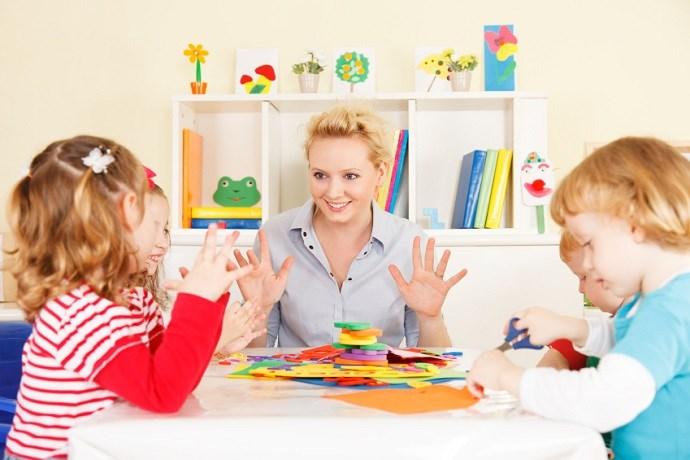
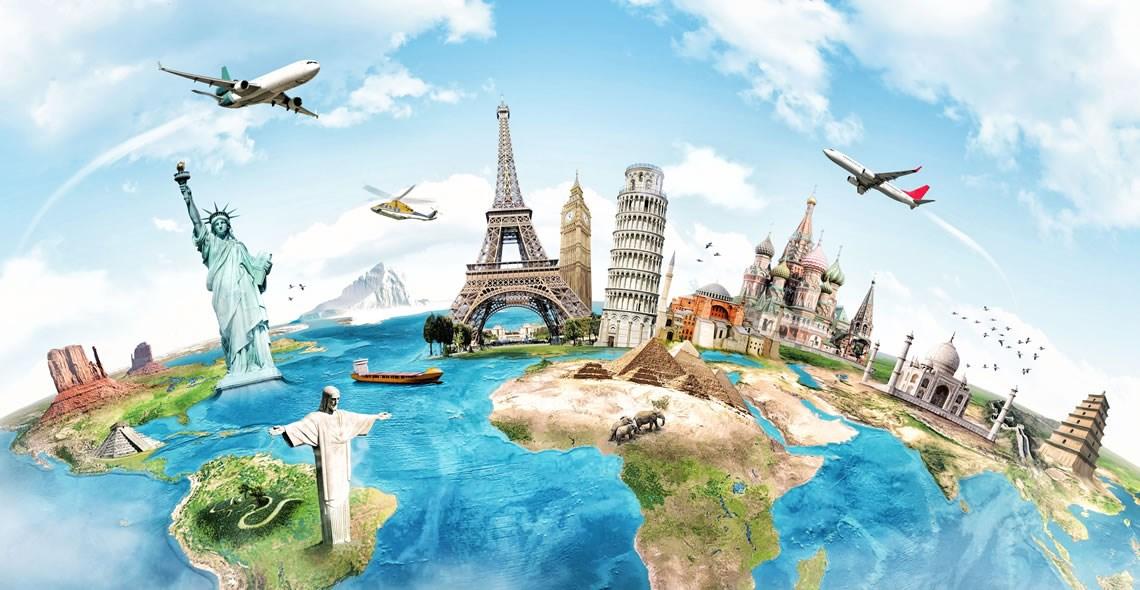
Do you want to learn more about the effects of biological and environmental factors on the growth of a child, the importance of play and activities in a child’s healthy development, and understand the ways to make a positive impact in this field?
Students will be introduced to child development and care that includes a vocational and project based element. The qualification comprises of 1 examination unit and 1 unit of controlled assessment. Each unit is worth 50% of the overall grade.
The content includes:
Child Development
Factors that influence the child’s development
Care routines, play activities to support the child
Early years provision
Legislation, policies and procedures in the early years
Expectations of the early years practitioners
Roles and responsibilities within early years settings
The importance of observations in early years childcare
Planning in early years childcare
A qualification in Child Development will be beneficial for your future, the course provides a strong base for progression to further education, in subjects such as Early Years, Childcare and Education, Health and Social Care. You could also progress onto an apprenticeship. The understanding and skills gained through this qualification could be useful to progress onto an apprenticeship in the early years sector
Careers progression - nursery nurse, early years educator, teaching assistant, child psychologist.
If you require any more information regarding Child Development and Care in Early Years, please speak to Miss Brown. You could also speak to a number of the year 10 and 11 students who are currently completing the course. “For a small child there is no division between playing and learning; between the things he or she does ‘just for fun’ and things that are ‘educational.’ The child learns while living and any part of living that is enjoyable is also play.” Penelope Leach

Travel and Tourism is a BTEC Technical Award. Learners are required and achieve all three components included in the qualification.
Component 1: Travel and Tourism Organisations and Destinations.
Learning aim A - Investigate the aims of UK travel and tourism organisations. Students will be able to describe the type and purpose of different travel and tourism organisations.
Learning aim B - Explore travel and tourism and tourist destinations. Students will be able to describe different types of UK tourist destination and give examples of the different features that would appeal to different types of visitor.
Component 2: Influences on Global Travel and Tourism.
Students will explore the different factors that may influence global travel and tourism, and how travel and tourism organisations and destinations respond to these factors.
Component 3: Customer Needs in Travel and Tourism
Students will investigate how organisations use market research to identify travel and tourism trends, and customer needs and preferences. They will apply their understanding by selecting products and services, and planning a holiday to meet customer needs and preferences.
The travel and tourism sector is the UK’s third-largest employer, accounting for 9.5 per cent of total employment. Tourism is one of the fastest-growing sectors in the UK in employment terms, employing nearly 3 million people, and the value of tourism to the UK economy is approximately £121 billion (7.1 per cent) of UK GDP. In 2016, travel and tourism contributed 10.2 per cent of the world GDP, and the sector now supports 292 million people in employment – that’s one in ten jobs worldwide. Here are a few career opportunities: Travel Agent, Flight Attendant, Tour Operator, Hotel Manager, Event Organiser, Tour Guide, Leisure Activity Communicator or Train Driver. !
If you have any questions or would like more information, please contact Mr Hayes in the Travel & Tourism/PE department. The world is a book and those who do not travel read only one page. Saint Augustine

We are also able to enter students for a GCSE in range of additional languages. These languages are: Bengali, Chinese (spoken Mandarin), Gujarati, Japanese, Greek, Arabic, Polish, Portuguese, Panjabi, Russian, Turkish, Urdu, Spanish and Italian.
It is important to understand that to complete the GCSE you must be able to read and write fluently in the language. You will complete a Listening, Reading, Speaking and Writing exam at either Foundation (Grades 1-5) or Higher (Grades 5-9). Each exam is worth 25% of your marks and you have to complete all the exams to get a grade overall.

A qualification in a language can lead you into lots of jobs. You could become an interpreter (where you use mainly spoken language) or a translator (where you are translating documents, books etc), you could become a languages teacher but there are also many jobs which having a degree in languages would be useful for. Here are just some examples: Broadcast Journalist, Travel Blogger, Detective, Diplomatic Service Officer, English as a foreign language Teacher, International Aid/Development worker, Marketing Executive, or Sales Executive.
If you need further information, please speak to Mrs Cox (Director of MFL).
“Any time you think some other language is strange, remember that yours is just as strange, you’re just used to it.” Frank Smith


The Textile design course offers the opportunity to develop skills over a broad range of textile techniques and applications, such as printing, weaving, knitting, mixed media, digital applications, surface design, embroidery and installation. Practical work is produced by researching and developing ideas using drawing, digital exploration, and sketchbooks, supported by critical evaluation and an awareness of contemporary and historical artists, cultures and influences. There are two components:
Component 1 Portfolio: produce a sustained project and a selection of further work that represents the course of study. This is worth 60% of your overall marks:
Nature project – Producing a folder of work containing a wide variety of surface decoration techniques based upon natural forms and the investigation of textiles / fine artists who are also inspired by nature. Personal sustained project – Students will work upon a final major project to develop and extend their skills. The project can be based upon the theme of architecture / portraits / cultures and messages influenced by your own work.
Component 2: There is a separate externally set task paper. It features seven tasks and you have to complete one of them. You get preparation time, plus ten hours of supervised time. This is worth 40 % of your total marks.
A qualification in a Textiles can lead you into endless creative possibilities. Here are just some examples: Fashion designer, Fashion illustrator, Fashion journalist, Fashion stylist, Costume designer, Creative director, Digital textiles, Textile technologist, Interior designer, Museum/gallery, Conservator, Pattern cutter, Retail buyer, Teacher or lecturer, Textile designer, Theatre designer, Upholsterer, Wallpaper designer, Make-up artist, Hair dresser.
If you need further information, please speak to Miss Shepherd, <Miss Clark or Miss Branch-Evans (Director of Technology)
‘Textiles affect every part of our lives’ Blanton Godfrey

Grade
Grade average of 6.75 or above
Grade average of 5 or above
Grade average of 4.5 or above
Grade average of 4.5 or above
Minimum 5 GCSE passes
From at least 5 GCSEs (including English and Maths)
from at least 5 GCSEs (including English and Maths)
From at least 5 GCSEs (including English and Maths)
Permitted to study 4 single
A-Levels. May choose 3 if they wish.
3 A Levels
Combined A Level and BTEC
From at least 5 GCSEs (including English and Maths) T Level in Health/ T Level in Education
Including English and ideally 3 in Maths (Maths can be studied alongside Level 3 in this case)
All BTEC courses (triple extended diploma, 3 single BTECs or 1 single and a double diploma)
If a student doesn’t qualify for the above routes, the Level 2 Work-skills option may be available alongside English and/or Maths re-sit. In some cases, this can lead onto progression to Level 3 routes. A minimum of Grade 2 in English and Grade 2 in Maths is required for this programme.
Specific Course Requirements for A Levels
Applied Science- Minimum of a 4 in Maths and 5 in Science
Business- Minimum of 5 in Maths, English and Science
Biology- Minimum of 6 in Science and Maths. A grade average of 6.5
Chemistry- Minimum of 6 in Science and Maths. A grade average of 6.5
Computer Science- Minimum of 6 in Maths
Core Maths- Minimum of 5 in Maths (only a one year course, students must choose 3 others)
Economics- Minimum of 6 in Maths
English Literature- Minimum of 6 in English
Film- Minimum of 5 in English
Geography- Minimum of 5 in Geography
History- Minimum of 5 in History
A Level Law- Minimum of a 5 in English. A grade average of 5.5
Maths- Minimum of 6 in Science and Maths. A grade average of 6.5
Further Maths- As above PLUS a minimum of 7 at Maths GCSE
Modern Foreign Languages- Minimum of 6 in their chosen language
Physics- Minimum of 6 in Science and Maths. A grade average of 6.5
A Level Psychology- Minimum of 5 in Maths. A grade average of 5.5
R.E.- Minimum of 5 in English
Sociology- Minimum of 5 in English





Our advice when considering your subject choice is to choose subjects that:
• You are most likely to work enthusiastically and achieve well in
• You think you will enjoy and you feel you are good at
• Provide a balance and variety - by keeping a balance at this stage, you will not close off future options
• You may need for your future education and/or career path


• Do talk to parents, subject teachers and tutors - they are all here to help and support you.
• Do read the course details in this prospectus carefully and ask questions.
• Don’t choose a course just because you like a particular teacher.
• Don’t choose a course because your friends are choosing it. You are deciding about your future for you.



